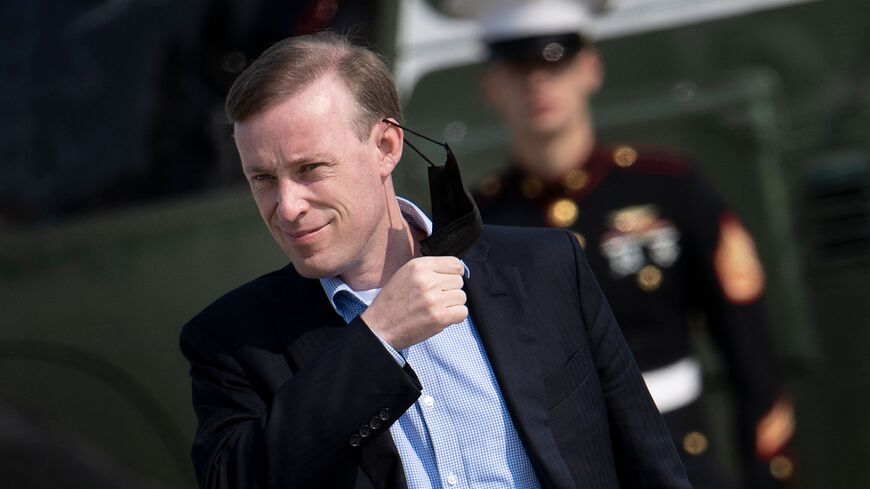US National Security Advisor Jake Sullivan is set to arrive in Saudi Arabia on Saturday on the most senior visit by a Biden administration official since the presidential visit in July 2022, and on the heels of China's breakthrough deal between Riyadh and Tehran last March.
Sullivan is expected to meet the country's de-facto ruler Saudi Crown Prince Mohammed bin Salman. The two spoke by phone on April 11, and White House Coordinator for the Middle East and North Africa Brett McGurk visited last month in anticipation of the visit.
The US senior official will be joined with officials from the UAE and India, in a bid to restore worn ties with Riyadh and boost regional integration. Speaking at the Washington Institute for Near East Policy on Thursday, Sullivan said he would be discussing "new areas of cooperation between New Delhi and the Gulf as well as the United States and the rest of the region."
Sheikh Tahnoon bin Zayed al-Nahyan, the UAE’s national security advisor and the chair of the Abu Dhabi Investment Authority, will be at the talks with Sullivan, a diplomatic source told Al-Monitor. The source said that Indian national security advisor Ajit Doval would also be at the talks.
The US, the UAE and India are part of the so-called “I2U2” group, which also includes Israel. The coalition was established in October 2021 to cooperate on joint initiatives in water, energy, transportation, space, health and food security. The I2U2 mechanism is also seen as a framework to counter China's influence in the region.
Israel, however, won’t be sending officials to Riyadh. Saudi Arabia has not normalized relations with Israel, and US efforts towards that goal have stalled as Israeli-Palestinian tension increased.
Regional integration
The officials will discuss diversifying supply chains and investments in strategic infrastructure projects, including ports, rail and minerals, Bloomberg reported Friday.
The trip also seeks to repair strained ties between Riyadh and Washington over several issues, including Saudi Arabia choosing to make OPEC cuts and the fallout from the murder of journalist Jamal Khashoggi at the Saudi consulate in Istanbul.
Mohammed Soliman, director of Middle East Institute's Strategic Technologies and Cyber Security Program, told Al-Monitor that Washington has two main aims of the trip. One to show that its relations with Riyadh are strong despite recent disagreements. The second is to include Saudi Arabia in Washington’s new approach of merging South Asia and the Middle East.
"While in the long term, there is a strategic imperative for Saudi Arabia to join the I2U2, it isn’t a necessity, as I2U2 is not an end itself but a format to achieve this vision of merging the two regions. More formats will emerge alongside I2U2," Soliman added.
A changed landscape
Afshin Molavi, senior fellow at the Foreign Policy Institute of the Johns Hopkins University School of Advanced International Studies, said that the trip will test US understanding and leverage of the new geoeconomic landscape of the Middle East.
"For the past decade or so, geopolitics has been the prime driver in the Middle East region, but geoeconomics is now an equal driver in some respects. Saudi Arabia is now riding and, in several cases, leading this train," Molavi told Al-Monitor.
The Jeddah Security and Development Summit last year, for instance, brought together the six Gulf Cooperation Council (GCC) states plus Egypt, Iraq, and Jordan. The I2U2 grouping is another example, as well as the rise in GCC investments in the region.
"Jake Sullivan would be well-served to understand that the region's geo-economics are rising as its geopolitical risk is decelerating," Molavi said. "Washington should encourage and support this shift and look for creative partnerships to fuel this paradigm."
He pointed to the decrease in tensions amid the Iran-Saudi rapprochement, the Al Ula agreement that ended the dispute with Qatar and several regional states, and negotiations to end the Yemen war.
“Of course, geopolitical risks remain, but Saudi Arabia seems to be heading in a new and different direction, one of foreign policy de-escalation and geo-economic acceleration," he said pointing to a dramatic shift.
Molavi said that for too long, Washington has failed to see the region's enormous potential as a node of connectivity in the global economy and a key source of surplus capital driving growth far outside its borders. The country is also on the verge of producing more copper and green hydrogen, which are vital to a green energy transition.
“Meanwhile, we will still need fossil fuels for quite some time, and Saudi Arabia remains the most powerful producer,” Molavi added. “Saudi investments in the region could boost development, but most importantly, a less hazardous regional environment could pave the way for more outside investment."
Secretary of State Antony Blinken is also due to visit the kingdom in June for a meeting of the global coalition to defeat ISIS, the Islamic State terrorist group, Bloomberg reported Friday, citing anonymous sources.








